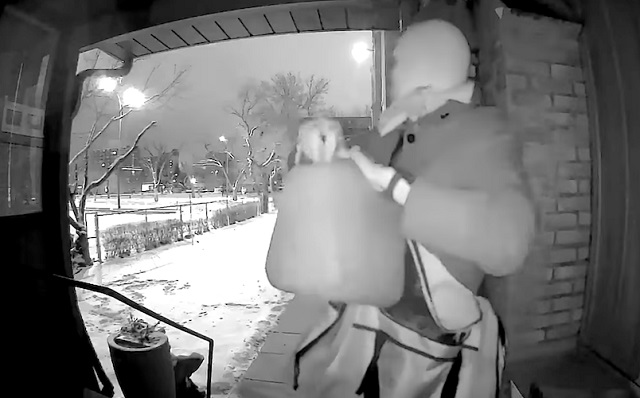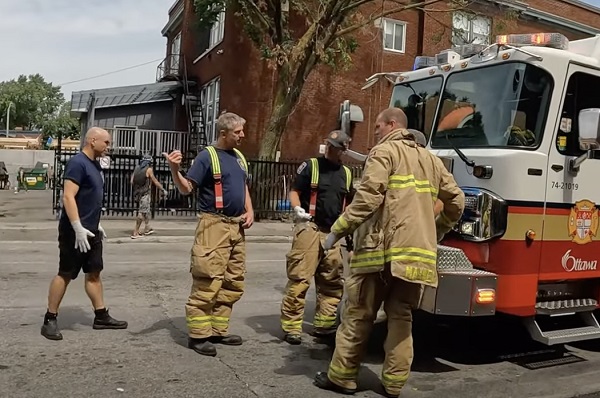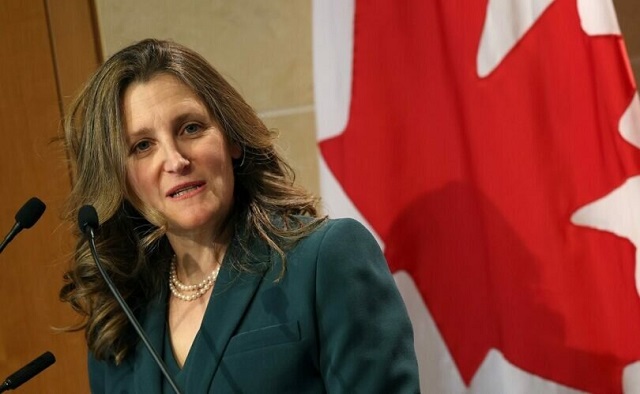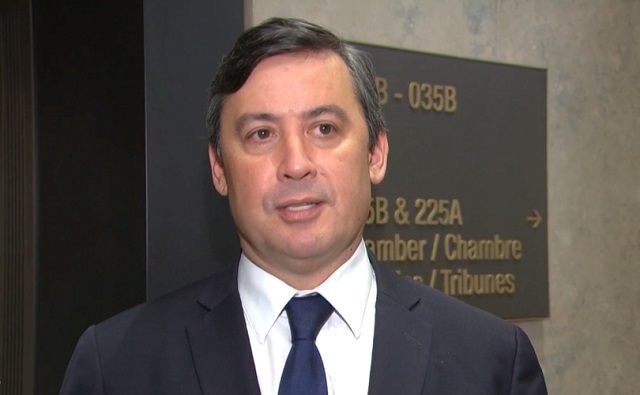Crime
Rocky Mountain House RCMP solve armed robbery investigation and lay charges

October 11, 2018
Leslieville, Alberta – The Rocky Mountain House RCMP utilized DNA evidence to identify and lay charges against two suspects in an armed robbery which occurred at the Leslieville Bar on October 14, 2017.
The lengthy investigation began almost a year ago following a 9-1-1 call received at 4:16 p.m. Two males reportedly entered the bar wearing masks and coveralls and carrying guns and knives. Several patrons were in the bar at the time and forced to stay inside during the robbery. A large amount of money was taken from the bar and the two males fled in a waiting Dodge Ram truck. RCMP attended and launched their investigation.
Following months of collecting witness statements, following up on public tips, processing various pieces of evidence and executing warrants, investigative results have led the RCMP to the following charges:
34-year-old Harvey James Lee-Bernick of Red Deer has been charged with robbery with a firearm and possession of a weapon for a dangerous purpose.
22-year-old Austin Kim Derkatz of Rimbey has also been charged with robbery with a firearm and possession of a weapon for a dangerous purpose.
Both accused are next scheduled for court on October 24, 2018 in Rocky Mountain House Provincial Court.
The identity of the driver of the associated truck has not been established. The Dodge Ram truck has been recovered. RCMP continue to investigate in an effort to identify and charge the driver.
BACKGROUND:
For Immediate Release
Rocky Mountain House RCMP – Armed Robbery at Leslieville Hotel
Leslieville, Alberta – On Saturday, October 14, 2017, at approximately 4:00 p.m., Rocky Mountain House RCMP responded to an armed robbery at the Leslieville Hotel. Two males entered the hotel, one armed with a sawed off long barrelled firearm and the other with a knife. The culprits demanded money from one of the employees. Both fled the hotel with an undisclosed amount of cash and quickly departed in a silver Dodge Ram truck. The get away vehicle was being driven by another male who was waiting outside the Hotel during the robbery. No one was physically injured during the incident.
RCMP continue to investigate this occurrence. If you have information about this investigation, please call the Rocky Mountain House RCMP at 403-845-2882 or call your local police service. If you want to remain anonymous you can contact Crime Stoppers by phone at 1-800-222-8477 (TIPS), by internet at www.tipsubmit.com or by SMS.
Crime
Canadian receives one-year jail sentence, lifetime firearms ban for setting church on fire

From LifeSiteNews
Jordan Willet was convicted of starting a blaze in February at Blessed Sacrament Parish in Regina, Saskatchewan.
A man who was charged with arson after trying to burn down a historic Catholic church earlier this year was handed only a one-year jail sentence for his crime but has also been banned from being able to possess firearms for life.
On April 9, a court sentenced Jordan Willet, 31, to 278 days in jail for intentionally or recklessly causing damage by fire or explosion to property and for not complying with a probation order. In February, LifeSiteNews reported that Willet had been arrested and charged with starting a fire at Blessed Sacrament Parish in Regina, Saskatchewan, on February 9.
He pleaded guilty to both charges and also received an 18-month probation sentence along with a lifetime firearm prohibition.
Over the weekend, Fr. James Hentges, the parish pastor, said he was “relieved he is in custody and is not a threat.”
The parish had posted footage of the February 9 attack on social media and put out a plea for anyone who had information on the event to report it to police.
The video footage of the attack, taken from a doorbell camera, shows Willet, in a mask, pouring fuel on the church before setting it on fire.
Fire investigators determined that the blaze was caused by a direct act of arson.
Since the spring of 2021, more than 100 churches, most of them Catholic, have been burned or vandalized across Canada. The attacks on the churches came shortly after the unconfirmed discovery of “unmarked graves” at now-closed residential schools once run by the Church in parts of the country.
In 2021 and 2022, the mainstream media ran with inflammatory and dubious claims that hundreds of children were buried and disregarded by Catholic priests and nuns who ran some of the schools.
Despite the church burnings, the federal government under Prime Minister Justin Trudeau has done nothing substantial to bring those responsible to justice or to stem the root cause of the burnings.
The claims, which were promoted by Trudeau among others, lack any physical evidence and were based solely on soil disturbances found via ground-penetrating radar.
In fact, in August 2023, one such site underwent a four-week excavation and yielded no remains.
Despite the lack of evidence, the Canadian Broadcasting Corporation (CBC) and others have continued to push the narrative, even running a report recently that appeared to justify the dozens of attacks against Catholic churches.
In January, Conservative Party leader Pierre Poilievre not only condemned the rash of church burnings in Canada but called out Trudeau for being silent on the matter.
Addictions
Liberal MP blasts Trudeau-backed ‘safe supply’ drug programs, linking them to ‘chaos’ in cities

First responders in Ottawa dealing with a crisis Fridayman 0102 / YouTube
From LifeSiteNews
‘There is certainly the perception by a lot of Canadians that a lot of downtown cores are basically out of control,’ Liberal MP Dr. Marcus Powlowski said, before pointing specifically to ‘safe supply’ drugs and injection sites.
A Liberal MP has seemingly taken issue with “safe supply” drug policies for increasing public disorder in Canada, policies his own party, under the leadership of Prime Minister Justin Trudeau, has endorsed.
During an April 15 health committee meeting in the House of Commons, Liberal MP Dr. Marcus Powlowski, while pressing the Royal Canadian Mounted Police (RCMP), stated that “safe supply” drug policies have caused Canadians to feel unsafe in downtown Ottawa and in other major cities across the country.
“There is certainly the perception by a lot of Canadians that a lot of downtown cores are basically out of control,” Powlowski said.
“Certainly there is also the perception that around places like safe supply, safe injection sites, that things are worse, that there are people openly stoned in the street,” he continued.
“People are getting cardio-pulmonary resuscitation performed on them in the street. There are needles around on the street. There is excrement on the street,” Powlowski added.
“Safe supply“ is the term used to refer to government-prescribed drugs that are given to addicts under the assumption that a more controlled batch of narcotics reduces the risk of overdose – critics of the policy argue that giving addicts drugs only enables their behavior, puts the public at risk, disincentivizes recovery from addiction and has not reduced, and sometimes even increased, overdose deaths where implemented.
Powlowski, who has worked as an emergency room physician, also stated that violence from drug users has become a problem in Ottawa, especially in areas near so-called “safe supply” drug sites which operate within blocks of Parliament Hill.
“A few months ago I was downtown in a bar here in Ottawa, not that I do that very often, but a couple of colleagues I met up with, one was assaulted as he was going to the bar, another one was threatened,” said Powlowski.
“Within a month of that I was returning down Wellington Street from downtown, the Rideau Centre, and my son who is 15 was coming after me,” he continued. “It was nighttime and there was someone out in the middle of the street, yelling and screaming, accosting cars.”
Liberal MP Dr. Brendan Hanley, the Yukon’s former chief medical officer, testified in support of Powlowski, saying, “My colleague Dr. Powlowski described what it’s like to walk around downtown Ottawa here, and certainly when I walk home every day, I encounter similar circumstances.”
“Do you agree this is a problem?” Powlowski pressed RCMP deputy commissioner Dwayne McDonald. “Do you agree for a lot of Canadians who are not involved with drugs, that they are increasingly unhappy with society in downtown cores which are this way? Do you want to do more about this, and if you do want to do more about this, what do you need?”
McDonald acknowledged the issue but failed to offer a solution, responding, “One of the success factors required for decriminalization is public support.”
“I think when you are faced with situations where, as we have experienced in our communities and we hear from our communities, where public consumption in some places may lead to other members of the public feeling at risk or threatened or vulnerable to street level crime, it does present a challenge,” he continued.
Deaths from drug overdoses in Canada have gone through the roof in recent years, particularly in British Columbia after Trudeau’s federal government effectively decriminalized hard drugs in the province.
Under the policy, which launched in early 2023, the federal government began allowing people within the province to possess up to 2.5 grams of hard drugs without criminal penalty, but selling drugs remained a crime.
The policy has been widely criticized, especially after it was found that the province broke three different drug-related overdose records in the first month the new law was in effect.
The effects of decriminalizing hard drugs in various parts of Canada has been exposed in Aaron Gunn’s recent documentary, Canada is Dying, and in U.K. Telegraph journalist Steven Edginton’s mini-documentary, Canada’s Woke Nightmare: A Warning to the West.
Gunn says he documents the “general societal chaos and explosion of drug use in every major Canadian city.”
“Overdose deaths are up 1,000 percent in the last 10 years,” he said in his film, adding that “[e]very day in Vancouver four people are randomly attacked.”
-

 Housing2 days ago
Housing2 days agoTrudeau’s 2024 budget could drive out investment as housing bubble continues
-

 Alberta2 days ago
Alberta2 days agoAlberta government should create flat 8% personal and business income tax rate in Alberta
-

 Censorship Industrial Complex2 days ago
Censorship Industrial Complex2 days agoDesperate Liberals move to stop MPs from calling Trudeau ‘corrupt’
-

 Great Reset2 days ago
Great Reset2 days agoTerrorists Welcome: Chronic counterterrorism lapses at the border demand investigation
-

 Health21 hours ago
Health21 hours agoTransgender activists are threatening the author of scathing UK report on child ‘sex changes’
-

 National2 days ago
National2 days agoLow and middle income Canadians hit hardest by high marginal effective tax rates
-

 conflict2 days ago
conflict2 days agoCol. Douglas Macgregor: US is ‘facing disaster’ as it funds overseas wars while bankrupt
-

 Energy2 days ago
Energy2 days agoA Wealth-Creating Way of Reducing Global CO2 Emissions





